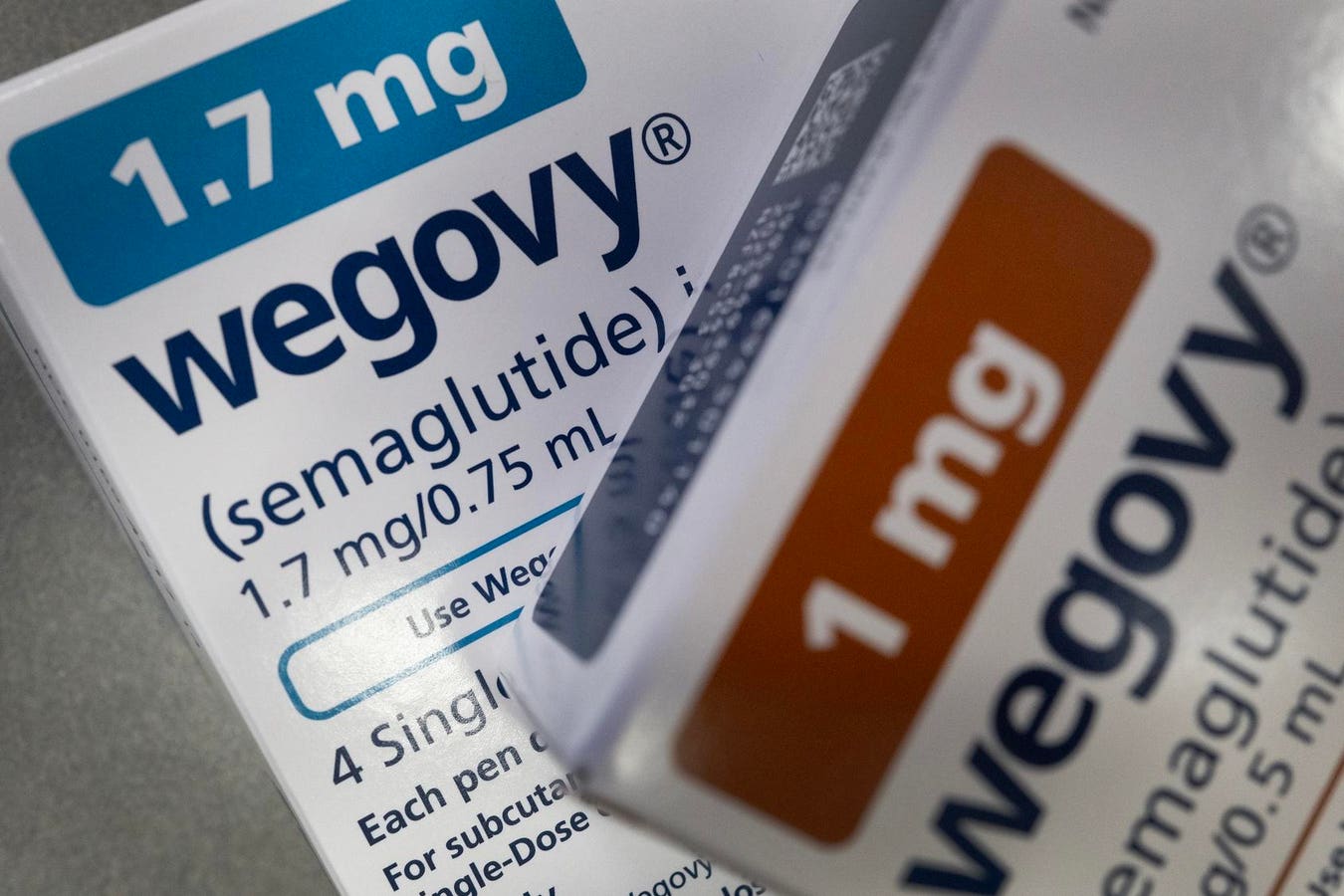In this photo illustration, the injectable weight-loss medication Wegovy is shown. (Photo … More
A new survey report from the International Foundation of Employee Benefit Plans shows continued reluctance by United States employers to cover glucagon-like peptide-1 drugs for weight loss. Going forward, however, lower net costs may induce better coverage by employers. Makers of GLP-1s for obesity are offering an array of discounts, some to insurers, others directly to patients.
The IFEBP first conducted the survey in Oct. 2023 and again in May 2024. In the latest survey released ten days ago, employers revealed that 55% of them provide coverage of GLP-1s for diabetes only, while only 36% provide coverage for both diabetes and weight loss. And of those employers currently offering GLP-1 drug coverage solely for diabetes, just 17% are considering reimbursement of drugs for weight loss. Broadly speaking, the survey responses demonstrate that a large number of employers are still unwilling to reimburse GLP-1s for obesity.
The weight loss therapeutics activate the body’s receptors for GLP-1 on its own or in combination with GIP. When released by the gut, these natural hormones increase insulin delivery, suppress appetite, slow stomach emptying and increase the feeling of fullness.
Perhaps what’s driving continued reluctance to cover these products for weight loss is the overall impact that GLP-1s have on employers’ pharmacy budgets. GLP-1 drugs used for obesity account for an average of 10.5% of total annual claims in the 2025 survey.
In parts of the traditional health plans’ market, we observe that some insurers are reconsidering their coverage of GLP-1s. Blue Cross Blue Shield, for example, just announced a reversal in its policy in which some plans offered coverage of GLP-1s for obesity. Starting in January 2026, BCBS will no longer cover these medicines for weight loss across the insurer’s standard plans.
At the same time, however, the large insurer Cigna announced it will begin capping out-of-pocket costs at $200 per month, starting next month, for patients using the obesity drugs Wegovy (semaglutide) and Zepbound (tirzepatide) through an add-on to its pharmacy benefit management plans. This is aimed at encouraging more employers to offer coverage of the drugs. It’s unknown what the net cost to Cigna will be for the medicines. But presumably, the insurer has been able to reach a deal that’s favorable financially, meaning a substantial reduction in net costs.
It’s possible in future that employers decide to revisit their coverage decisions if net costs decrease sufficiently, combined with more data showing the benefits of weight loss drugs when taken consistently and in conjunction with an appropriate dietary and exercise regimen.
Also, the pharmaceutical firm Novo Nordisk announced last month a new partnership with CVS Caremark, the nation’s largest pharmacy benefit manager, which grants coverage of Wegovy over its competitor Zepbound for customers who are insured for obesity medications. It’s presumed that CVS was able to negotiate sizable rebates for Wegovy.
CVS Caremark said that for insured patients, starting this July, Wegovy and Saxenda (liraglutide) will be the preferred GLP-1 medicines on its largest commercial formularies. This implies fewer access restrictions such as prior authorization, but also lower patient cost-sharing. It’s unknown precisely what this means in terms of out-of-pocket costs for patients. But most patients with coverage for obesity drugs have monthly cost-sharing under $100.
The arrangements reached by Cigna and CVS could help bring down net prices for employers for popular weight loss medicines. And at the same time, under the Inflation Reduction Act, the federal government is negotiating the prices of the GLP-1s Ozempic (semaglutide) and Wegovy. So-called maximum fair prices will be publicly posted in early 2026. These could reflect even steeper discounts.
In addition to what payers are doing, Novo Nordisk is pursuing a direct-to-patient strategy to regain market share it has lost to drug maker Eli Lilly in the lucrative obesity drug market. Here, Novo Nordisk struck a deal in which CVS pharmacy will offer Wegovy for $499 a month for cash-paying customers who aren’t insured for the medication.
Since the Food and Drug Administration removed the active ingredients semaglutide and tirzepatide from its shortage list, the business model of selling directly at a considerable discount to the consumer has become popular for the two main manufacturers of obesity drugs.
In 2024, Eli Lilly adopted a direct-to-consumer strategy for Zepbound, among other products, with its LillyDirect program. This service includes a DTC pharmacy and a referral network of in-person and telehealth clinicians. LillyDirect allows uninsured or underinsured individuals not on Medicaid or Medicare to purchase Zepbound product directly after obtaining the requisite prescription from their doctor. The firm recently extended the range of Zepbound products available through LillyDirect by adding high-dose vials at $499.
Rival Novo Nordisk also launched a DTC option, NovoCare Pharmacy, two months ago. Patients not insured in the public sector who wish to have access to Wegovy can acquire the drug for an out-of-pocket cost of $499 per month, provided they have a prescription and make use of a designated specialty pharmacy. And, since the end of April, customers also pay a $499 monthly subscription when they obtain Wegovy from Ro and LifeMD, and $599 at Hims & Hers.
While employers aren’t yet reimbursing weight loss drugs en masse, significantly reduced net costs could affect their future coverage decisions.








